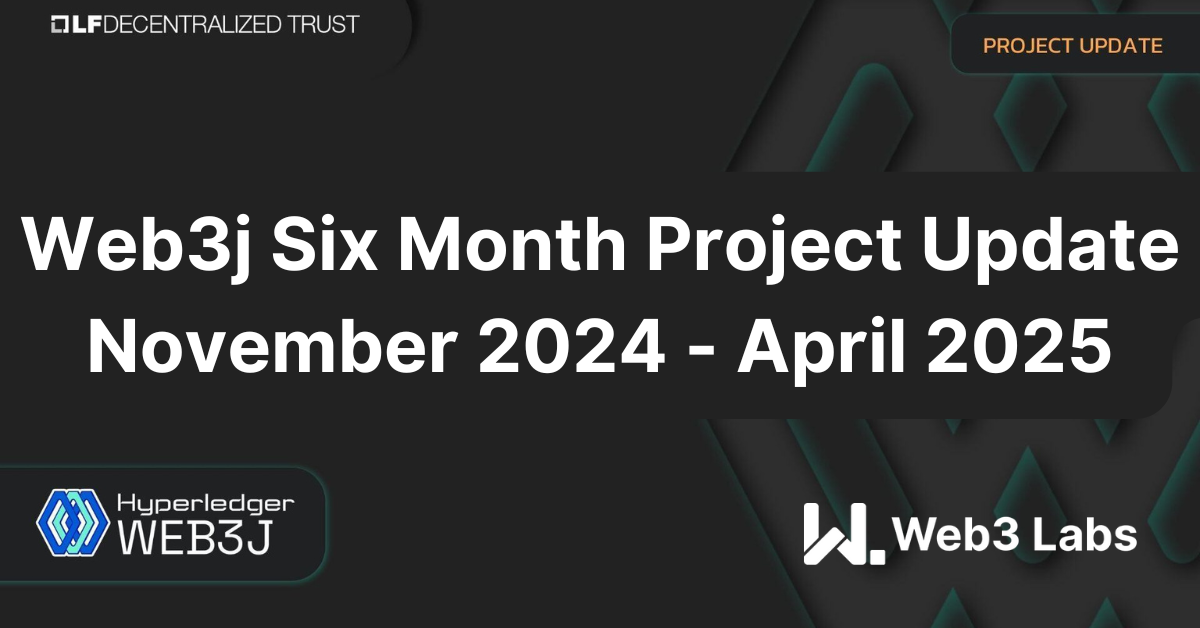Web3j Six Month Project Update

November 2024 - April 2025
This report summarizes the activities and accomplishments of Web3j, an LF Decentralized Trust project, from November 2024 to April 2025. During this period, the project made significant strides in improving the framework’s functionality, enhancing user engagement, and bolstering overall community interaction.
Key highlights include successful library upgrades, a noteworthy LF Decentralized Trust mentorship initiative, and critical integrations that elevate Web3j's capabilities and compatibility. This document outlines the achievements against previously set goals and provides an overview of additional developments that enrich the Web3j ecosystem.
Performance Against Prior Goals
The current project roadmap is public and can be found here.
Goals Achieved
During the last six months, the project has achieved the following goals:
- Upgrade web3j-android branch to the latest version and release libraries as Android artifacts - this was done during the 2024 mentorship under Hyperledger Foundation:
- Organized the First Web3J Hyperledger Ecosystem Summit - an event at which we connected with the enterprise users of Web3j and collected feedback:
- Connect with the community through various events:
- Event: What’s New With The Smart Contract & Ethereum Network Library
- Public contributors call every 2 weeks.
- Solved bugs and closed part of the open issues:
- Closed 15 open issues across all Web3j repositories;
- Implemented, reviewed, and merged over 20 Pull requests in the Web3j repositories that fixed different bugs or improved the functionalities, such as:
- Fix ENS CCIP, ERC-3668
- Fix build scripts on web3j-android
- Fix Web3j Transaction logic to return the expected chainId when interacting with Solidity 0.8.26 or 0.8.27
- Clean subscription after EVM websocket disconnects
- Catch all the exception during EVM response parsing
- Improve codebase by fixing Sonar reported issues
- Extended ENS integration support (details in this blog post):
- Added support for Holesky
- Set Primary Name functionality
- Manage ENS record metadata
- Manage ENS Service metadata
- Refactor the off-chain gas provider inside the library to work dynamically: https://github.com/LFDT-web3j/web3j/pull/2142
- Enhanced Web3j libraries by migration to Java 21, Kotlin 2.1.0 and integration with a more recent version of the EVM client, Besu:
- web3j-evm : https://github.com/LFDT-web3j/web3j-evm/pull/122
- web3j-unit: https://github.com/LFDT-web3j/web3j-unit/pull/92
- web3j: https://github.com/LFDT-web3j/web3j/pull/2166
- web3j-cli: https://github.com/LFDT-web3j/web3j-cli/pull/121
- web3j-gradle-plugin: https://github.com/LFDT-web3j/web3j-gradle-plugin/pull/98
- web3j-maven-plugin: https://github.com/LFDT-web3j/web3j-maven-plugin/pull/137
- Prague/Electra Upgrade:
- EIP-7702 support: https://github.com/LFDT-web3j/web3j/pull/2178
Other Accomplishments
Except the goals mentioned above we managed to achieve other accomplishments also for Web3j project:
- Removed "Hyperledger" from the project name to streamline the Web3j brand under LF Decentralized Trust
- Submitted and got approval for two Web3j mentorship programs, which will take place in 2025, under Linux Foundation Decentralized Trust Membership Program:
- LFDT - Web3j Libraries Full Development Lifecycle - This project aims to enhance the core Web3j by improving and bringing up to date its component libraries as web3j-unit, web3j-evm, web3j-openapi, focusing on reducing existing issues and integrating the missing EIPs. By improving the additional Web3j libraries, we aim to streamline development workflows, enhance testability, and create a more robust framework that simplifies Ethereum development for Java and JVM-based projects.
- LFDT - Web3j: Enhancing JVM Android Support with Kotlin Wrappers for Solidity Smart Contracts - This project proposes to build upon the accomplishments of the prior mentorship by further enhancing and expanding the functionalities of the Web3j-Android library. Given Kotlin's prominence as the preferred programming language for Android development, this initiative aims specifically to facilitate the generation of Kotlin-based smart contract wrappers.
- Added support for Solidity versions 0.8.27, 0.8.28, 0.8.29 in web3j compiler (web3j-sokt) for processing new Solidity Smart Contracts
- Fixed external imports of the Solidity Smart Contracts for the resulting Java Wrappers in order to manage complex smart contracts which are using different libraries within the web3j: https://github.com/LFDT-web3j/web3j-solidity-gradle-plugin/pull/78
- Improved the Java Wrapper smart contract generation for files that have duplicate event names: https://github.com/LFDT-web3j/web3j/pull/2124
- Added RPC support for Linea networks: https://github.com/LFDT-web3j/web3j/pull/2150
- Added support for Solidity Custom Error Type: https://github.com/LFDT-web3j/web3j/pull/2173
- Released three versions for the library during this period:
Conclusion
The past six months have marked considerable progress for the Web3j project. The successful completion of major updates, including the significant upgrade to web3j-android and improved ENS integration, exemplifies the team's commitment to continuous improvement and innovation.
Additionally, proactive community engagement, highlighted by the first Web3j Hyperledger Ecosystem Summit and frequent contributor interactions, has fostered a more vibrant and collaborative environment. Looking forward, approved mentorship programs and ongoing enhancements underscore a promising trajectory for Web3j, ensuring it remains a robust, versatile tool for Ethereum and smart contract developers.
